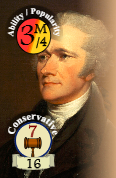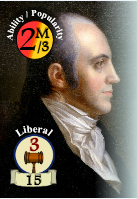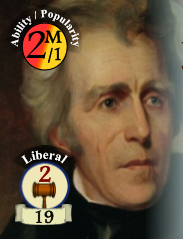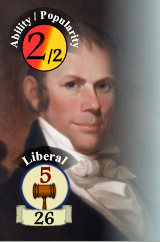Name a famous duel from American history. Yup, Aaron Burr did shoot Alexander Hamilton. Any more? No? On the 211th anniversary of the Burr-Hamilton duel, let's take a look at other American duels.
 Alexander Hamilton |
 Aaron Burr |
August 1, 1800: Hamilton-Adams
After Washington's retirement from the presidency it was perhaps natural
that his two successors would wrangle. Even worse, while Alexander Hamilton had
Washington's heart, John Adams held the presidency. And yet it was Hamilton who
exerted the most influence over their shared Federalist party, over
the Cabinet and, Hamilton hoped, over the army. By 1800 Adams could
brook no more. He fired the Cabinet and began insulting Hamilton
in meetings, accusing him of heading a "British faction" and employing
epithets such as "Creole bastard" and "bastard brat of a Scotch peddlar".
Never one to back down, Hamilton authored a
short letter
in return, pretty much an invitation to a duel.
Adams, however, refusing to be drawn in, never replied and a duel was
averted in this case. Hamilton had to content himself by writing a
vicious pamphlet exposing Adams defects: "distempered jealousy", "extreme
egotism" and "ungovernable temper". This backfired as Federalist
readers charged Hamilton with emotionalism and betrayal.
July 11, 1804: Burr-Hamilton
Not all may remember that at the time of the duel Aaron Burr was actually
the sitting Vice President, perhaps because everyone knew his time in that
office would end soon. After he failed to yield gracefully during the
presidential election tie of 1800, he lost Jefferson's trust. That in another
tie, a tied vote in the Senate, he failed to support the administration's
position no doubt sealed this impression.
May 30, 1806: Andrew Jackson-Charles Dickinson
Charles Dickinson had claimed Jackson had reneged on a lost horseracing bet
and threw in a claim that his wife Rachel was a bigamist. Dickinson probably
felt safe in shooting off his mouth as he was considered one of the
best duelists in America. Not deterred, Jackson threw down the
gauntlet anyway. Dickinson shot first, putting a bullet in Jackson's
chest. With incredible coolness and stoicism, Jackson used his hand
to stop the blood flow and fired. The gun misfired. No doubt in
great pain, Jackson coolly re-cocked his gun and fired again,
killing his opponent. Jackson never had the bullet removed and would
live with chronic pain for the rest of his life.
 Andrew Jackson |
 Thomas Hart Benton |
September 4, 1813: Andrew Jackson-Thomas Hart Benton
Not really a duel, but a gunfight in an ongoing feud. The feud
began out of an earlier duel when Jackson had served as a second for
a friend dueling Benton's brother Jesse. Both men had survived, but
the Bentons blamed Jackson for the original conflict.
Now both found themselves in Nashville one morning. Word quickly reached both parties that the other was in town. When Jackson found out he and his confederates immediately rushed over to the tavern where the Bentons were. Finding Thomas he brandished his whip and told Benton to defend himself. Benton reached for his pistol, but found Jackson had already put his against his chest. Jackson backed Benton through a corridor and onto a porch when Benton saw Jesse slip behind Jackson and shoot. Jackson pitched forward and fired. Thomas Benton fired twice at Jackson's falling form. Thomas tried to fire again, but a bystander shielded his bleeding form.
Then Jackson's friend John Coffee fired at Thomas Benton, but missed. Seeing that Benton was out of ammunition, Coffee went forward, intending to club with his pistol. Benton fell backwards down a flight of stairs.
Another of Jackson's friends, Stockley Hays (who had been in the Burr expedition), charged Jesse with a sword cane, but the blade broke on a button. Jesse fired on Hays, but the gun misfired.
The fight was over. Jackson had two bullets in his left shoulder and physicians were frantic to staunch the blood flow. All but one wanted to amputate the arm, but Jackson refused. The Bentons stood outside the Inn where he had been taken shouting defiance.
Apparently the severity of the conflict was sufficient to prevent further such incidents. Later Thomas Benton would become a Senator and one of Jackson's most fervent supporters.
August 12, 1817: Thomas Hart Benton-Charles Lucas
Benton and Lucas were rival attorneys who had contested a
case in 1816 that Benton lost. In response he challenged Lucas to
a duel, claiming an insult. Lucas refused, but in 1817 challenged
Benton's right to vote due to unpaid taxes. Benton issued a new
challenge that this time Lucas accepted. At a distance of thirty feet, Benton
wounded Lucas in the throat and was only grazed in return.
September 27, 1817: Thomas Hart Benton-Charles Lucas
Unlike the fracas with Jackson, the first encounter left Benton
unsatisfied; he challenged Lucas again, stipulating a distance of just
nine feet. This time Lucas missed while Benton shot him in the
chest, dead. The incident did not prevent Benton from being elected
to the US Senate in 1820.
February 6, 1819: Mason-McCarty
Armistead Mason of Virginia was the grand-nephew of famous Constitutional
Convention delegate, George Mason. Somehow he found himself appointed
to the Senate, despite being six years shy of the Constitutionally-mandated
age of 35. He promised to resign as soon as his term was over, and
apparently everyone thought this was all right. (!)
George Mason's daughter was the mother of John Mason
McCarty and the plantations of the two cousins were in close proximity.
Ironically, Mason questioned McCarty's right to vote,
as he thought him still under age, at which McCarty became so incensed
that he challenge Mason to a duel. However, he also prescribed the
terms and conditions, which traditionally was the right of the
challenged. Mason therefore had every right to decline, and did.
McCarty could have re-framed his challenge, but did not, contenting
himself with instead going around calling Mason a coward. So Mason
challenged McCarty, who now declined, claiming he'd had his chance.
Several months passed and the issue seemed to be dead. But at
this point Andrew Jackson stepped in and convinced Mason that he
should issue the challenge again. McCarty just repeated his earlier
answer, however, upon which Mason's seconds threatened to broadcast
the case for his cowardice far and wide and McCarty changed his mind,
but in the strangest ways and it is here that one begins to wonder
about McCarty's sanity, if there is any sanity in dueling at all.
First he proposed that they both jump off the US Capitol Dome, then
that they both up a powder keg while both were standing on
it. Refused both of these, he suggested muskets finally at ten feet,
a fatally close proxmiity. Eventually they agreed on twelve feet, but
with only a single ball each. In a heavy snowstorm, McCarty shot Mason
dead while his bullet tore up McCarty's wrist, arm and shoulder.
March 22, 1820: Decatur-Barron
In 1808, Stephen Decatur, hero of the Barbary Wars, sat on the
court-martial that suspended from the navy his former friend, Commodore James
Barron. This stemmed from an incident the year before in which
Barron had refused to resist the British boarding his flagship to "impress",
i.e. dragoon, sailors. (It appears not so much that Barron would have been
unwilling, but that he and his ship had been caught completely unprepared.)
When Barron did not return from England during the war of 1812,
Decatur criticized, and prevented his return to the Navy. Thus in
March Barron challenged Decatur to a duel to be held in Bladensburg,
Maryland (the same site as our previous duel). Both fired and hit.
Barron apologized to Decatur as he fell.
Decatur accepted, saying it was an honorable duel.
Decatur died while Barron recovered and was reinstated to the Navy,
albeit at diminished rank.
 Henry Clay |
April 8, 1826: Henry Clay-John Randolph
Henry Clay was Secretary of State (for John Quincy Adams) and John
Randolph a Senator from Virginia. On the Senate floor Randolph
referred to the president and the secretary as a case of "puritan
with the blackleg" (a fatal livestock disease). Clay challenged him
and Randolph accepted, even though the Senate had a rule that this
was not allowed in response to speeches made in the Senate. However,
Randolph secretly planned to just fire in the air, only telling a
few friends such as Thomas Hart Benton. But in the event, Randolph's
pistol misfired. Clay insisted that the duel go forward and this
time Randolph missed. Clay then shot twice, missing both times, but
grazing his coat.
Randolph then deliberately missed. The two politicians then shook hands
and ended the matter, Randolph saying "You owe me a coat, Mr. Clay".
1836: Jessie Bynum-Daniel Jenifer
Congressman Bynum hailed from North Carolina, Jenifer from Maryland.
Jenifer had denounced President Jackson and his party on the House
floor, upon which Bynum rose up and called his speech
"ungentlemanly". Jenifer insisted on a retraction which Bynum refused.
Soon other Congressmen were serving as their seconds. Standing just ten
feet apart, both missed. They fired again. Same result. After five
rounds of complete misses, Bynum's gun went off prematurely, probably
an accident. But it appeared to one of Jenifer's seconds as a rules
violation so he aimed his pistol at Bynum, who was only saved by
Jenifer's timely intervention. Jenifer then took his shot and once
again missed. The duel was called a draw and everyone walked away
unhurt on this occasion.
February 24, 1838: Graves-Cilley
Representative William Graves of Kentucky was incensed at
Representative Jonathan Cilley of Maine who accused him of bribery.
When Graves tried to send Cilley a letter that was refused, Graves
issued his challenge. After two rounds of dueling, there was no
result, but instead of calling it a day, they continued for a third
round, in which Cilley was killed. The Supreme Court boycotted the
funeral in protest and even that dueling expert Andrew Jackson was upset,
demanding that Congress pass an anti-dueling law. They did, but of course
it did little good.
 Abraham Lincoln |
September 22, 1842: Lincoln-Shields
Even a Statesman like Abraham Lincoln could get caught up in the
mania for dueling when he published a letter insulting state auditor
James Shields. The Illinois State Bank had gone bankrupt and
announced that it would no longer accept its own paper currency.
Shields ratified this decision, upon which Lincoln wrote an
anonymous critical letter, in which he also criticized Shields'
pursuit of women. Mary Todd, who Lincoln had lately been seeing,
supported this with another anonymous letter. Shields demanded that
the publisher reveal the authors and once he found out, demanded a
retraction. Lincoln refused, asking that Shields rewrite the demand
in a more gentlemanly fashion. This triggered the challenge.
As the challenged, Lincoln had the choice of weapons and chose the largest possible cavalry broadswords, saying "I didn't want the d----d fellow to kill me." Lincoln hoped to use his superior reach and height – 6'4" vs. 5'9" – to disarm his opponent. To start off he demonstrated his strength and reach by cutting off a high willow branch. This was enough to deter Shields and the two called a truce. Lincoln averred that he had had no intention of injuring Shields' personal or private character.
Shields would go on to serve under Zachary Taylor in the war with Mexico and as a Senator for Illinois and Minnesota. Twenty years later he became a brigadier general in the Army of the Potomac and defeated Stonewall Jackson at the Battle of Kernstown, arguably the only man ever to do so. But Shields was gravely wounded in the process. Lincoln promoted him to Major General. After the war he became Senator a third time in 1879, this time for Missouri, making him the only person ever to be Senator for three different states.
Why does the Duel card return to the deck again and again? Because in American history that's what the sad spectacle of dueling did.
Created: 11 July 2015

